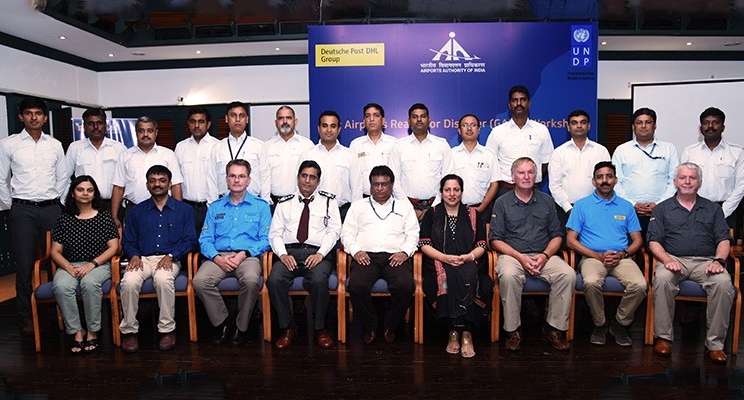UNDP and DPDHL organise GARD workshop for AAI officials
August 6, 2018: At Calicut International Airport in Kozhikode, Kerala, 14 airport operations experts from across India have gathered for a five-day training from 6-10 August 2018 to learn how to make their airports disaster-ready, and to become national trainers for GARD (Get Airports Ready for Disaster) workshops in India.

August 6, 2018: At Calicut International Airport in Kozhikode, Kerala, 14 airport operations experts from across India have gathered for a five-day training from 6-10 August 2018 to learn how to make their airports disaster-ready, and to become national trainers for GARD (Get Airports Ready for Disaster) workshops in India.
United Nations Development Programme (UNDP) and the Deutsche Post DHL Group (DPDHL) are expanding their internationally recognised GARD program with officials and experts from the Airports Authority of India (AAI). This workshop will include a new Train the Facilitator (TtF) element for countries that are at above average risk for natural disasters. This not only supports airport authorities in their efforts to build resilience against future natural disasters, but also enables participants to train others at the national level.
“Channeling relief efforts from airports to affected communities require efficient operational procedures, and appropriate infrastructure capabilities” said Subhash Kumar, general manager at the Airports Authority of India. “In addition to reassessing airport facilities and strengthening staff expertise, this workshop will allow us to build up our readiness for any potential emergencies across the country and regionally.”
At the workshop, facilitators-in-training will learn how to evaluate the current level of preparedness at airports, conduct training exercises, and develop specific recommendations and ready an action plan to ensure that airports are prepared for future disasters.
“The new initiative allows airports to conduct the GARD training when it suits the regional needs best – that makes the roll out much more flexible,” explains Chris Weeks, DPDHL Director for Humanitarian Affairs. “Furthermore, the Train the Facilitator workshop allows us to share our knowledge that we have gathered in more than nine years’ of experience with others and thereby scale up the number of GARD trained airports to make the program even more effective.”
To ensure fast and effective assistance in the immediate aftermath of a natural or man-made disaster, besides having the necessary airport infrastructure and local transport connections to smoothly deliver lifesaving support to impacted communities, the team on site needs to be trained in the necessary protocols and know-how to handle the dramatic rise in air traffic and flow of goods and people that typically follows a disaster.
“With increased vulnerability due to climate change, it is essential to strengthen national capacities and resilience to natural disaster. These include training local authorities in special customs and immigration policies that need to be activated in the event of emergency, and having passenger evacuation plans or accommodation at the airport for the first 72 hours,” said Preeti Soni, assistant country director, UNDP. “The introduction of TtF GARD workshop will ensure that rescue and relief efforts can be carried out smoothly while reducing losses from natural disasters.”
So far, Guwahati and Chennai airports are already GARD-trained and thus prepared to handle emergencies better.



